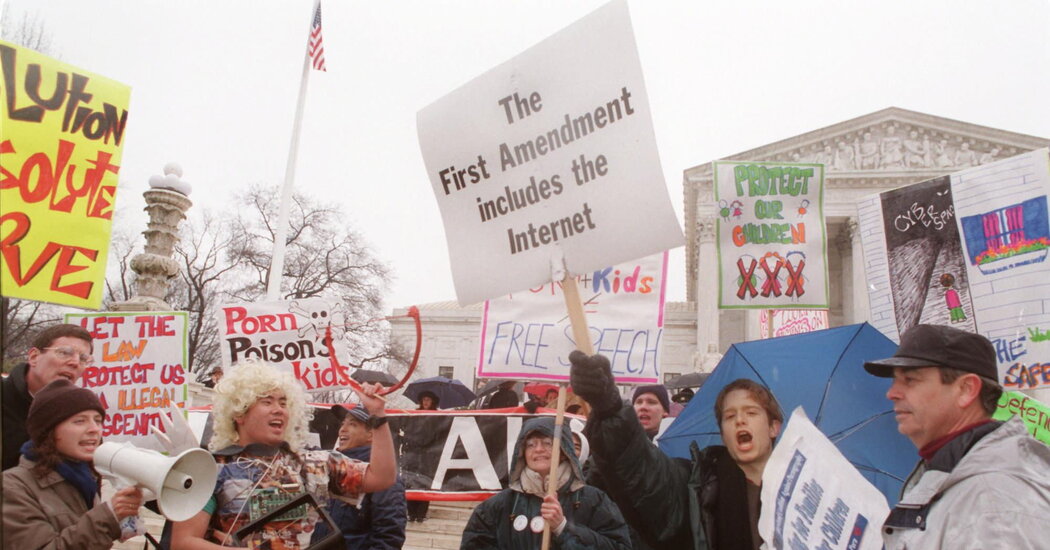
Mounting concerns over young people’s mental health have prompted state legislatures across the country to propose a slew of age restrictions to protect minors online. Lawmakers say the rules should help shield young people from online pornography, predators and harmful social media posts.
The current push for age restrictions on certain online content echoes a similar legislative drive three decades ago, when the internet was in its infancy. In 1996, Congress passed a major telecommunications bill that made it illegal to knowingly send or display “obscene or indecent” material to people under 18.
That law had a longstanding precedent: federal rules dating back to the 1920s that prohibited radio and TV shows from broadcasting obscene language, to prevent a child wandering into a living room from overhearing it.
The anti-pornography rules in the 1990s had strong bipartisan support. But civil liberties groups thought the prohibitions on online indecency violated the First Amendment and squelched free speech. Among other objections, they said it was too difficult and expensive for websites to verify a visitor’s age. That could have led sites to simply get rid of anything inappropriate for children, creating a Disneyfied internet.
To protect Americans’ access to information that could potentially be deemed indecent under the new law — like educational material about AIDS — the American Civil Liberties Union sued the government, challenging part of the law called the Communications Decency Act.
The A.C.L.U. wanted its name on the lawsuit, said Chris Hansen, a former senior lawyer for the group. But to be a plaintiff, the group needed to be directly threatened by the law and there was nothing on its website that could potentially “harm” children. So the A.C.L.U. uploaded a Supreme Court ruling concerning a riff by the comedian George Carlin on the seven dirtiest words in the English language, which included a transcript of Mr. Carlin’s monologue in all its un-bleeped glory.
The A.C.L.U. also posted a quiz asking readers to guess the seven obscenities.
After a federal court in Philadelphia temporarily halted the law, the government appealed, and the case, Reno v. A.C.L.U., named for Bill Clinton’s attorney general, Janet Reno, was taken up by the Supreme Court. There, the A.C.L.U. argued that the law’s speech restrictions could curb the internet’s unique potential and prevent people — including minors — from having access to all kinds of information.
The A.C.L.U. contended that the internet, where users typed or clicked to get to a web page, was more like a book or newspaper than radio or TV, recalled Ann Beeson, a former assistant legal director for the group. Language in printed material, which individuals freely perused, was more lightly regulated than in broadcast media, where audiences had less control over what they were exposed to.
The justices at the time were not especially familiar with the internet. So court employees arranged a demonstration to show how easy it was to find pornography. Senator Ted Cruz, then a Supreme Court law clerk, later recounted how he, alongside Justice Sandra Day O’Connor, had looked at “hard-core, explicit” image results for a search of a fruit sometimes used as a bawdy euphemism for breasts.
The Supreme Court ultimately sided with the A.C.L.U., finding that the federal restrictions could chill free speech.
The judges said the blanket restrictions were unacceptable because parents would soon be able to use content-filtering software to protect their children, and because age-verification systems at the time, which had typically involved verifying a user’s credit card, were not yet widely available. (That has changed; today, many current online age-checking systems use credentials like a driver’s licenses to verify a user’s age. One vendor said they were now easily integrated and cost as little as 10 cents per visitor.)
In its ruling, the Supreme Court upheld a longstanding principle in American law that “you can’t censor speech to adults in the name of protecting minors,” Mr. Hansen said. If the A.C.L.U. had lost, “the internet would not be what it currently is.”
But that was before the current, “extremely online” era in which critics say powerful social media algorithms have promoted hateful, divisive comments; scaled disinformation; and recommended posts on anorexia and self-harm to young girls.
To try to bolster online safeguards for children, California last year enacted the Age-Appropriate Design Code Act. The legislation would require online services that are likely to be used by young people — such as social media and video game platforms — to default to the highest privacy settings possible for minors.
It would also require those services to turn off by default features that could pose risks to minors, such as friend finders that might allow adult strangers to contact children.
A tech industry association, NetChoice, has now sued to block the children’s protections from taking effect next year. In a legal complaint filed in December, NetChoice said the restrictions would stifle important resources for users of all ages, echoing arguments made by the A.C.L.U. in the 1990s.
In March, the Congressional Research Service, a public policy institute that serves Congress, also weighed in, urging lawmakers to consider the possible unintended consequences of new online age restrictions — such as companies collecting more user data and limiting content.
Even so, lawmakers continue to propose new online age and content rules.
Last week in the Senate, Brian Schatz, a Hawaii Democrat, promised his new child online protection bill “will help us stop the growing social media health crisis among kids by setting a minimum age.”













